How Long Is A Marathon? (And Why Is It 26.2 Miles?)

A marathon is 26.2 miles or 42.2 kilometres long. All official marathons have to be this distance.
Slightly more precisely, a marathon is:
- 26 miles and 385 yards, which is 26.218 miles, or,
- 42.195 kilometres, which is 42,195 metres
A half marathon is exactly half the distance of a marathon: 13.1 miles or 21.1 kilometres.
But why is the marathon this very specific distance?
The answer takes us to Ancient Greece, then to the first modern Olympic Games of 1896, and then (sort of) to the British Royal Family, with a few legends along the way.
The Battle of Marathon
The events which inspired the modern marathon have been mythologised into legend. We don’t know how much of it really happened, but never let the truth get in the way of a good story.
Pheidippides is a central character. He was a herald, which is a messenger or courier, whose job was to run to deliver news. In 490 BC, when it was discovered that Persians had landed near the town of Marathon, and that they planned to take Athens, Pheidippides was dispatched to spread the word and call for help.
It’s often repeated that he ran the 25 miles from Marathon into Athens, but that’s not true. At least not yet.
Pheidippides was sent to Sparta, some 150 miles away across rugged terrain, where he went to request back-up from the army. Supposedly the Spartans were in the middle of a religious festival, and didn’t fancy the battle, so Pheidippides turned around and ran back. Whether he set off for Marathon or Athens isn’t agreed upon.
Meanwhile, the Greeks won the Battle of Marathon and the Persians fled. Fearing a second attack, the army marched to Athens, arriving in time to see more Persian ships retreating.
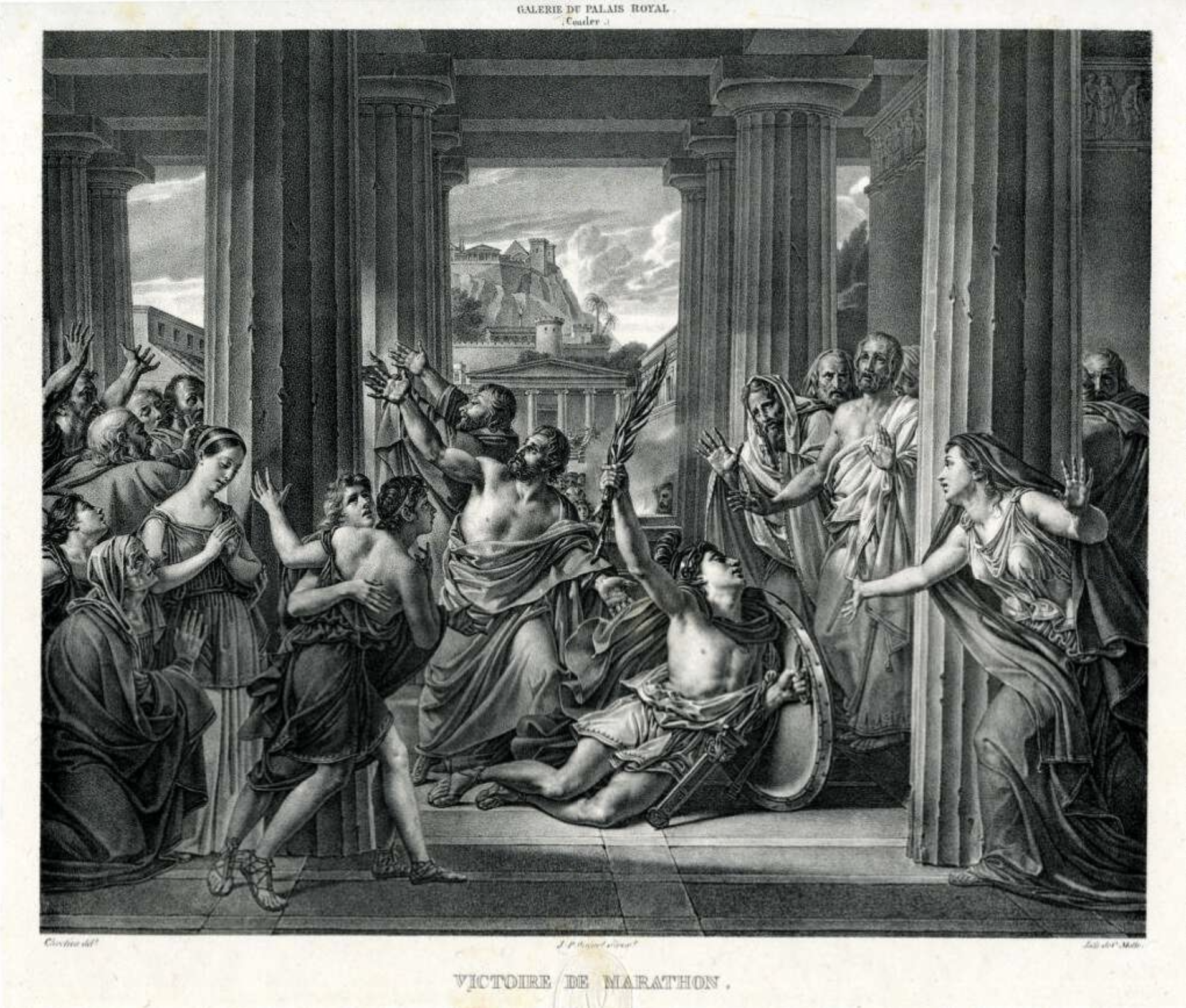
Above: An artist’s depiction of Pheidippides delivering his message
© The Trustees of the British Museum
It may have been that a messenger ran ahead to share the news, but there are conflicting names. Some say it was Pheidippides, others name Philippides, Thersipus of Erchius, or Eucles. It’s also often repeated that the messenger declared “Nike! Nike! Nenikekiam” (Victory! Victory! Rejoice, we conquer!) and then died after delivering the news, but this may just be some extra drama to the story-telling added hundreds or even thousands of years after the actual Battle of Marathon (it’s an event which has inspired poetry and art).
What is true, is that the battle and a (maybe mythical) run from Marathon to Athens inspired the modern race.
Fun fact for you: Marathon means ‘fennel’ in Greek. The Battle of Marathon took its name because there was a lot of the herb growing in that area!
The 1896 Modern Olympic Games
The ancient Olympic Games took place over 2,500 years ago, initially as a one-day event, then extending to five days. There were running events, throwing, jumping, combat sports and chariot racing (another fun fact: most events were competed naked!).
The main running event was a ‘stadion,’ a sprint of one straight length of around 200m. Other running events included the ‘diaulos,’ which was two stadions, with a tight turnaround at halfway; a ‘hoplitodromos,’ which was one or two stadions run in full armour; and longer races of up to 24 stadions (still less than 5km). There was no marathon in the Ancient Olympics.
When it was decided to host an international modern Olympic Games in 1896, it was proposed that there would be a long-distance run between Marathon and Athens, inspired by the legend of Pheidippides. The route was 40km. Greek water carrier Spyridon Louis was victorious in a time of 2:58. Some 100,000 home fans cheered him across the finish line.
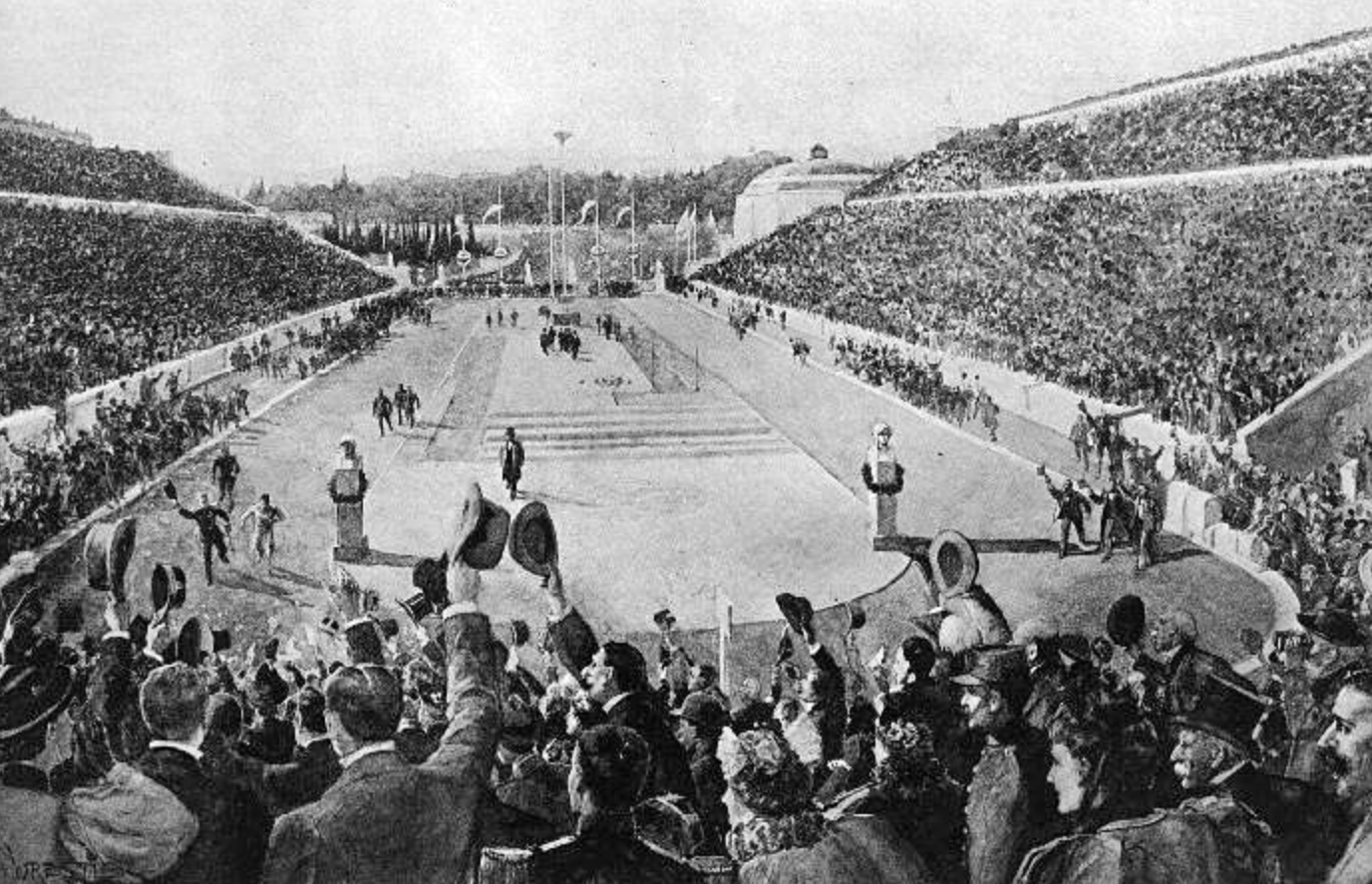
Above: A painting of Spyridon Louis winning the inaugural Olympic Marathon.
The Evolution of the Marathon, and the first 26.2
In 1897, the first Boston Marathon took place, inspired by the Olympics of the previous year. The race saw 15 men run a 24.5 mile (39.4km) route, with John McDermott winning in 2:55:50. Boston remains the longest-running continuous marathon.
At the 1900 Paris Olympic Games, the marathon was 40.26km and only seven men finished in the stifling summer heat. The marathon at the 1904 Games held in St Louis was described as ‘the strangest ever,’ with the first finisher of the 40km race later disqualified after it was discovered he’d hitched a ride for 11 miles.
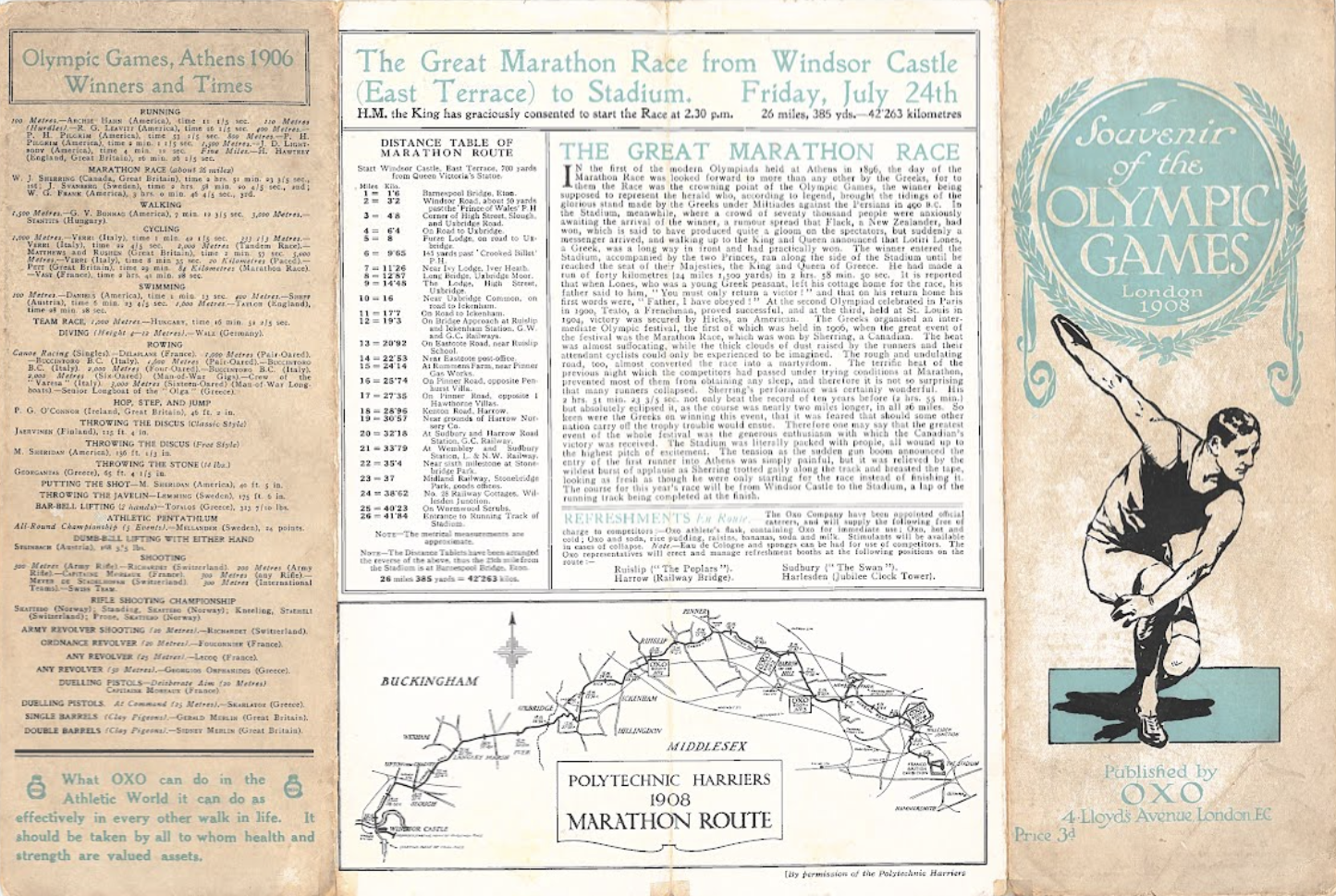
At London 1908, we come to another legendary story in the history of the marathon.
The final route for the run was only decided in the days leading up to the race, though it would be from Buckingham Palace to the White City Stadium. It was initially agreed that it would be 25 miles, but when officially measured it was 25.5 miles. Then it was decided to move the start to the East Terrace of Windsor Castle, extending the course: it was now 26 miles from the Castle to the outside of the stadium, with runners then completing one full lap of the track, adding almost 587 yards.
The plans changed again. It had been proposed that runners would come into the stadium through the Royal entrance, but that would prevent the Royals from leaving, so it was decided that runners would enter at the opposite side of the stadium, shortening the distance on the track, and finishing beneath the Royal Box as originally planned (all races finished there). This made the course 26 miles and 385 yards.
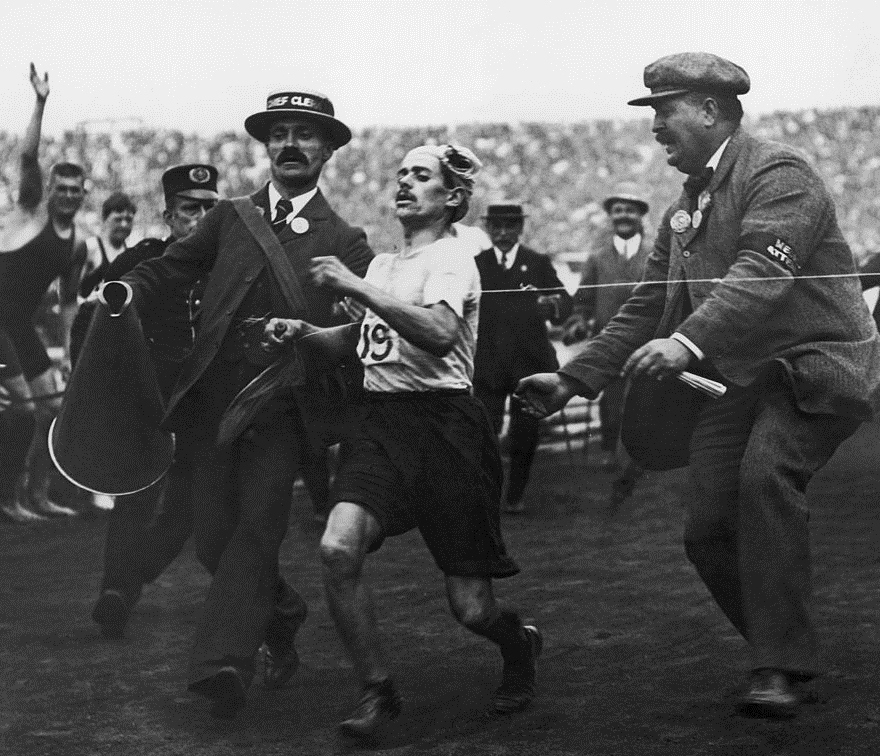
Above: Dorando Pietri finished first in the 1908 Olympic Marathon but was later disqualified
Also significant was that runners would go clockwise around the track, where all other races were run anti-clockwise. This ended up confusing the race leader who entered the stadium and went the wrong way, then collapsed and had to be carried over the line, which led to his disqualification. American Johnny Hayes won in 2:55:18.
In an interesting twist on history, London wasn’t even supposed to host the Olympics that year. It was due to be held in Rome, but was relocated because of financial reasons following the eruption of Mount Vesuvius in 1906. The distance we run today would likely be shorter were it not for that change, and for London’s role in the evolution of the marathon.
The Official Marathon Distance Is Decided
Each of the seven Olympic Games marathons run between 1896 and 1920 had varied in distance, with the longest being 42.7km at the 1920 Antwerp Games. In 1921, the marathon was formalised as 26.2 miles/42.2km, though there seems to be no explanation as to why that was the chosen distance.
From the 1924 Paris Olympic Games onwards, all runners competed at the new distance. The 1924 Boston Marathon also extended its course by moving the start line to Hopkinton so that it was now the official 26.2 mile distance. This means that 2024 marks 100 years that people have officially been running exactly 26.2 miles for fun.
Here Andy, Sarah and Rick discuss the myths and legends around how the marathon came to be 26.2 miles on The Running Channel podcast.





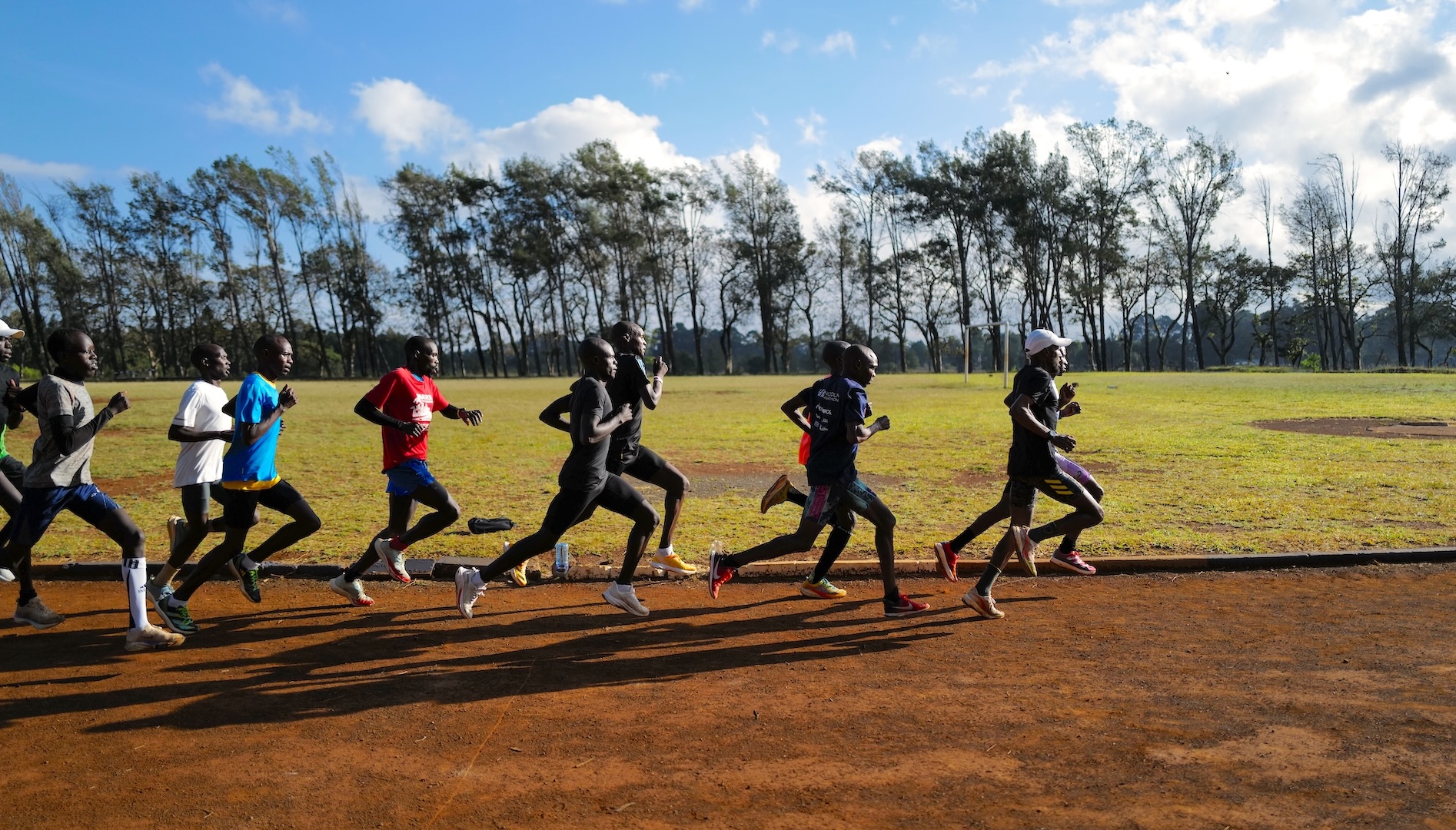















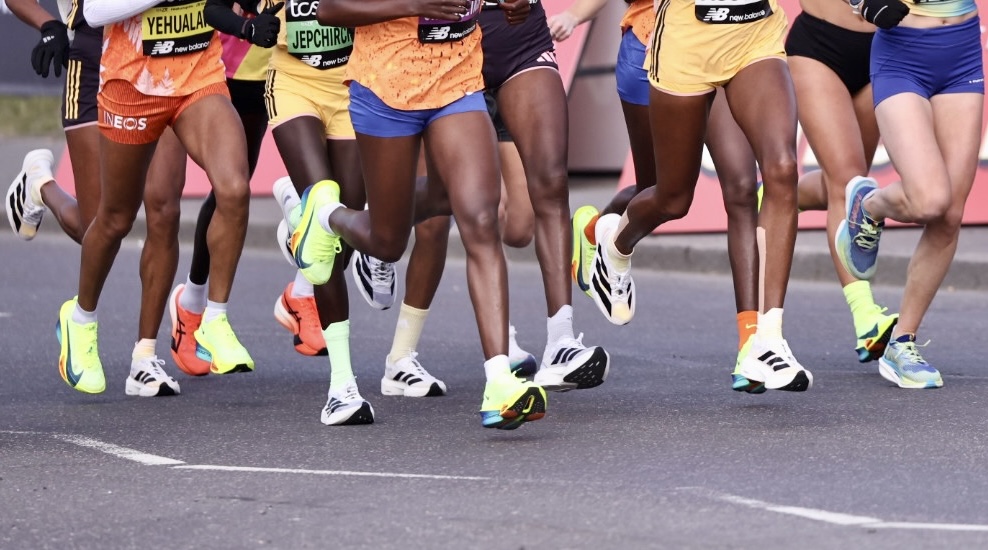
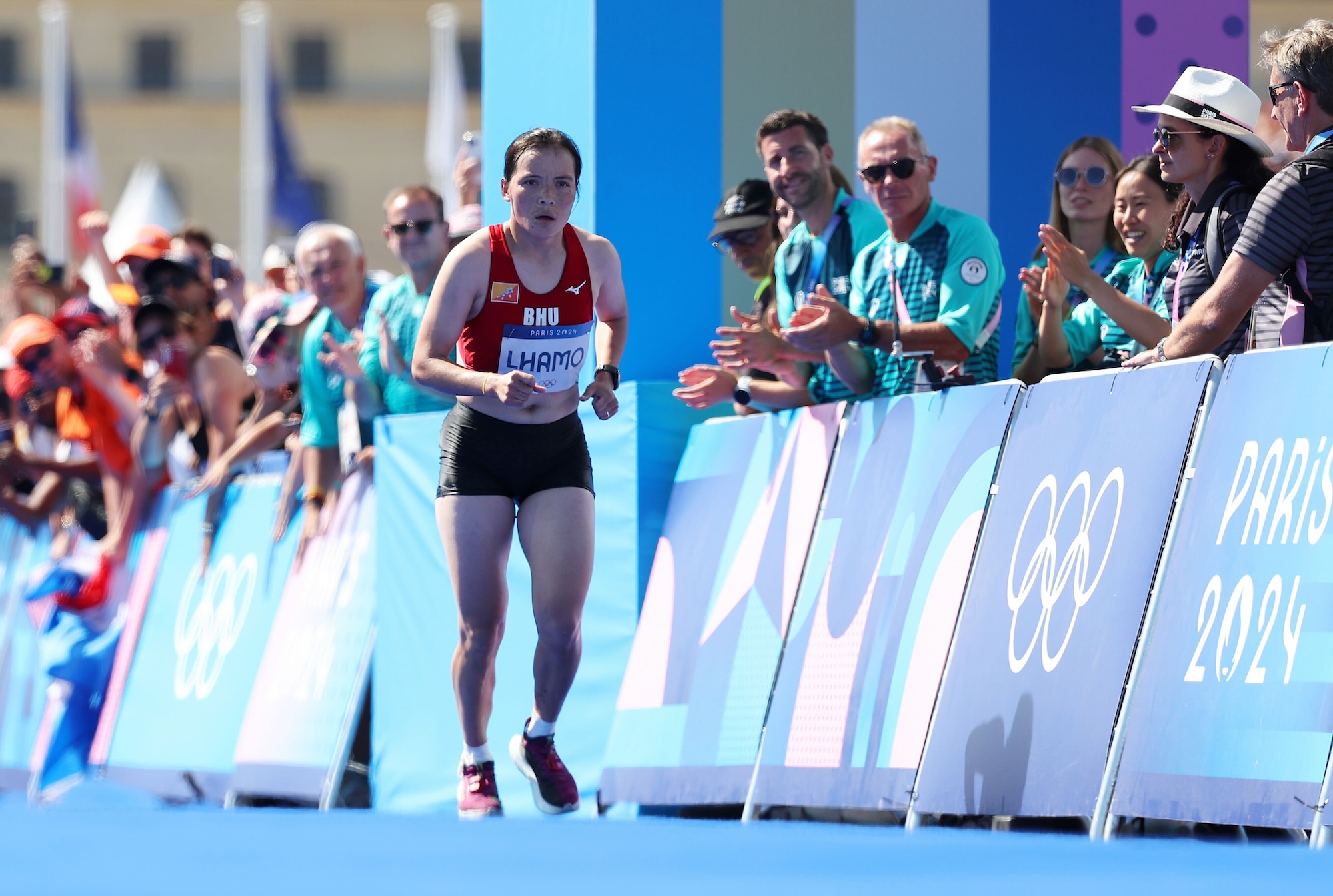





Running News
Could Shanghai Marathon Become A World Marathon Major?
Mengesha and Ketema Win The 2024 Berlin Marathon
ATHLOS 2024: An Incredible Night Of Women’s Track Racing in NYC